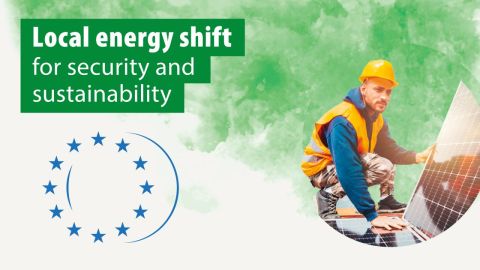
Europe has faced an unprecedented energy crisis triggered by the Russian invasion of Ukraine. At the same time we need to respond to the climate crisis. REPowerEU strengthens the resilience of the EU energy system and accelerates the deployment of renewables. Cohesion Policy is playing a key role in mobilising actors and providing resources such transformations. This session will focus on how the localisation of energy can contribute to the security and sustainability of the EU energy system.
10EU23692 - EN and OR version - Local energy shift for security and sustainability - YouTube
Registration closed
- Local and regional | Energy | Sustainable
- Code: 10EU23692
Practical information
- When
-
Tue 10/10/2023, 09:30 - 11:00 CET
- Type of partnership
- NONE
- Format
- EU session
- Theme
-
Local energy shift for security and sustainability
- Languages
- English, French, German, Italian, Spanish, Portuguese

Partner

Reporting
Session summary
The session started with a SLIDO poll asking participants which is, in their view, the biggest challenge to achieve local energy shifts. Most participants highlighted that it is the regulatory challenges.
In their interventions, the speakers highlighted the following key elements:
Bertrand Piccard insisted on the fact that a lot of energy that is produced is lost, ¾ of the energy is wasted. In this respect we need to be much more efficient and ask ourselves where it is more efficient to produce energy and save it? With the sharp drop in the cost of decentralised renewable energy sources (solar, wind, small hydro…) the centralisation vs delocalisation of our energy system is now a real question. He underscored that today it is more efficient to delocalise through renewables. A key success factor is to understand what delocalisation is, that it is profitable and for the ones that oppose change regulation and incentives are needed. This is a complete revolution that faces a lot of resistance, but all actors need to be pushed in this direction. Hence, he called for more courage and ambition, pointing at the fact that centralisation is the lazy solution. He mentioned that wasting heat and energy should be prohibited as this will pull existing solutions into the market.
Waltraud Schmid provided insights on the energy shift in Vienna based on their long-term goal to get to a climate neutral city by 2040, including phase out natural gas for space heating by then. She insisted on the need for a strong public infrastructure as well as for a socially just project and inclusive approach. As key element, solutions need to be tailor made, taking into account the density of the territories, in terms of habitants but also services like public transport offer. As a concrete examples, the city of Vienna owns 220 000 apartments: since not all are connected to district heating, for the other ones, following proper insulation, the energy supply was switched to heat pumps and renewable energy. Concretely in order to reach its 2040 target, about 450 000 individual boilers will have to be changed in Vienna, meaning something like 100 per days! Ms. Schmid also welcomed the EU policy direction and support through cohesion policy.
Cristina-Lucia Sucală presented the example of the transition process that started 12 years ago in Romania, Jiu Valley, a former coal mine area. It was initiated as an architectural initiative but then involved the whole community, including former miners. Through a close community-based work with an association grouping 4 NGOs, the cities in the region and the county council, the former coal mine has been turned into an art and cultural center. Ms. Sucală emphasized the central challenges of communication, lack of know-how at local level and working with the administration. This requires a big focus on capacity building. The financial support of the EU, such as with cohesion policy, and of the World Bank has played an important role in the development of the initiative in Jiu Valley.
Heleen Schockaert gave further information about RESCOOP that represents about 1000 renewable energy communities across Europe. Energy communities are not just about citizens taking ownership of the energy system but doing it with the citizens so they have a role to play in the future and impact our daily lives. The energy crises has made such developments even more necessary. Municipalities and local administrations are usually good allies of energy communities. She underlined that there are still many legal barriers on renewable energy communities with the legal enabling framework lagging in many Member States. The energy community movement would also need to work and include more vulnerable people and groups. Ms. Schockaert called for more recognition of energy communities and their specificities.



